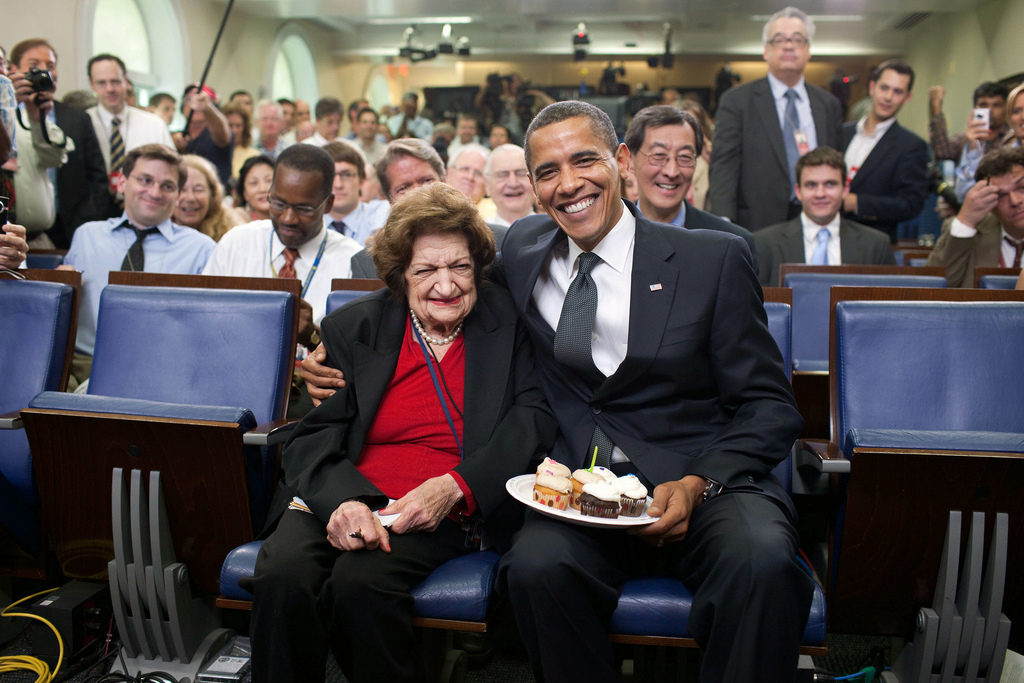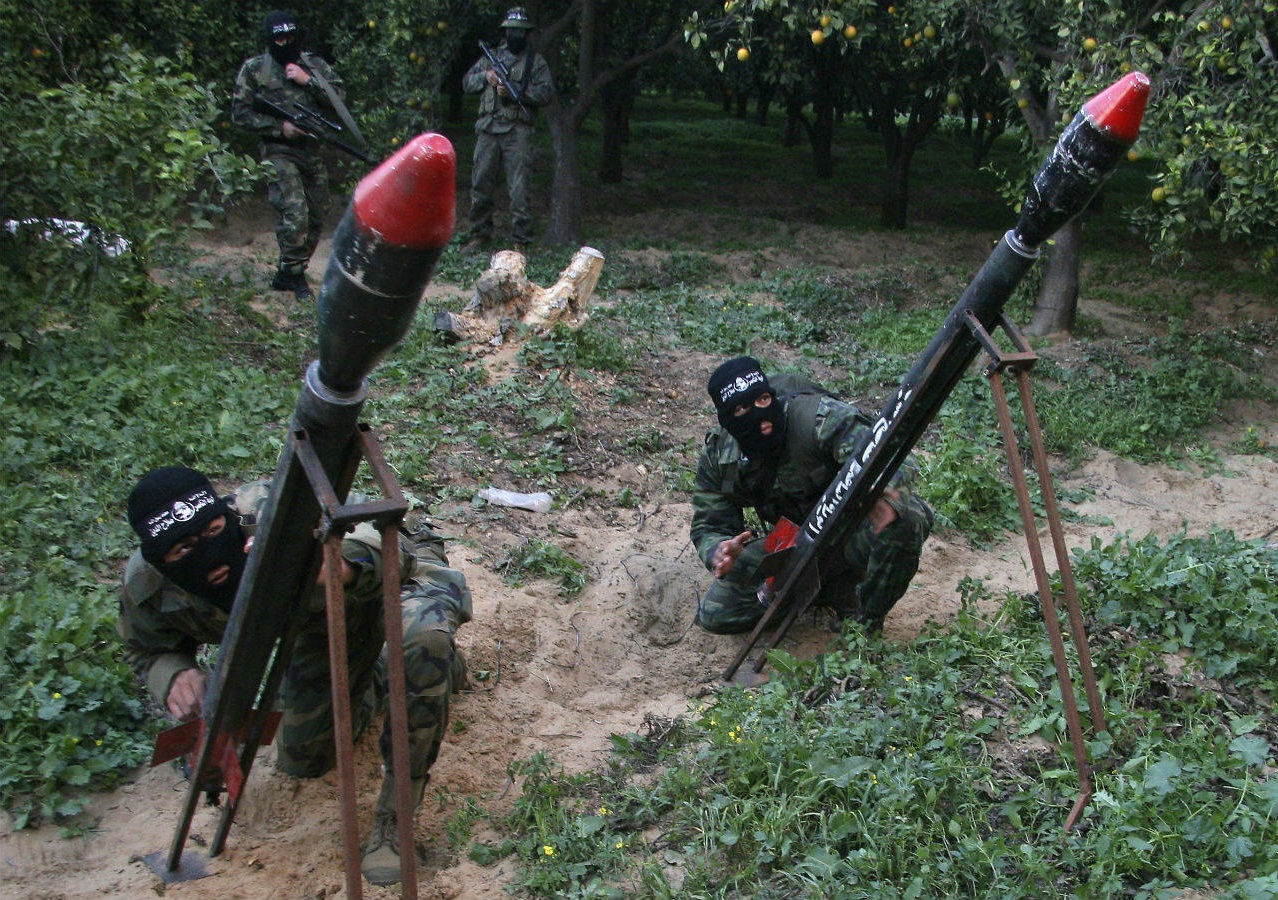Dealing with the Devil
The assumption that the Obama administration’s diplomatic initiative to our enemies will enhance America’s image in the world and increase our security is becoming more questionable with each passing day. What we have learned is that dialogue and accommodation with messianic, apocalyptic Islamic regimes like Iran are not only pointless, but threaten the stability of the international order.
In January, President Obama addressed the Iranian mullahs in terms suggesting a possible reconciliation between the two countries if the Iranians would “unclench their fist.” The speech was met with chants of “Death to America” and derision by the Iranian mullahs who demanded an apology for decades of past injustices allegedly committed by the US against the Iranian people, and ridiculed Obama’s slogan of “change” as a retreat forced upon America by Iran’s Islamic revolution. Later, Obama released a video offering Iran congratulations on the occasion of Nowruz, the Persian New Year. This initiative was also received coldly in Tehran.
Over the past several months, the President of the United States ……
has shown obeisance to a Wahhabi despot in a bowing gesture seen widely in the Arab world as a sign of submission;
shook the hand of a Venezuelan dictator who not only referred to him as an ”ignoramus” less than a month earlier, but is co-architect of the Russian-Iranian campaign to displace American influence in the southern hemisphere;
made serial apologies like “Bush did it”, “reset button” and “I was only (you fill in the blanks) when that happened” ad nauseum;
toyed with the idea of participating in the anti-Semitic Durban II Conference in Geneva in the naive belief that he could change the conclusions it would reach;
remained silent in the face of Iran’s fraudulent presidential election and the crushing of its opposition movement;
cut funding to the Iran Human Rights Documentation Center in New Haven that documented human rights violations in Iran;
snubbed the Dalai Lama, the exiled leader of Tibet, in mid-October so as not to offend China;
allowed “strict deadlines” on the international inspection of Iranian nuclear facilities to come and go without consequence;
allowed the State Department to cut funding for Freedom House, the bipartisan organization that reports on freedom and human rights throughout the world, because it publishes material critical of Iran;
failed to instruct the VOA’s Farsi Service to report more aggressively on Iranian actions;
failed to assist the independent Iranian-American and European radio and TV stations to overcome the Iranian regime’s jamming of their broadcasts;
failed to support the development of new software to evade Iranian “filtering” of the Internet and cellular phone calls;
surrendered our national pride by insulting the sacrifice made by Americans who died in World War II liberating Europe by referring to past American “arrogance”;
joined the UN Human Rights Council that would later endorse the infamous Goldstone Report albeit over American objections;
appointed individuals with strong anti-Israel biases to significant foreign policy posts;
made serial apologies for America’s responsibility for the current economic crisis, its failure to recognize Europe’s leading role in the world, dictating solutions to other nations (except Israel), the “legacies of slavery and segregation, past treatment of native Americans,” Guantanamo, Hiroshima, unilateralism, insufficient respect for the Muslim world, and the mistakes of the CIA (including the possible prosecution of former CIA interrogators);
pressured the Israelis to stop construction to accommodate the natural growth of their population in the major cities of the West Bank and East Jerusalem (demands seen by 96% of Israelis as patently unjust);
praised the history and culture of the Islamic world, and enhanced the historical record to magnify its achievements;
equated (in his June 4th Cairo speech) Palestinian suffering to Jewish suffering during the Holocaust, and the Palestinian situation with U.S. blacks in America before the civil rights movement (implying that Jews are oppressors);
gave the Presidential Medal of Freedom to two virulently anti-Israel people – Mary Robinson of Ireland and Desmond Tutu of South Africa;
condemned the Israeli occupation of the West Bank resulting from the Six-Day War in 1967 without mentioning the Egyptian, Jordanian and Syrian aggression that started that war and the numerous occasions before and since where the Palestinians have rejected Israel’s right to exist;
paid a visit to Ankara where he effectively endorsed Turkish Prime Minister Recep Tayyip Erdogan’s Islamization of Turkish foreign policy resulting in Turkey canceling Israeli participation in “Anatolian Eagle”, its annual multiple air maneuver with NATO in favor developing closer military ties with Iran and Syria;
virtually froze our defense budget in time of war (1);
has been unable to decide whether to seek victory, admit defeat or to keep the status quo in Afghanistan;
accepted the Nobel Peace Prize without having shown any real accomplishments;
unilaterally abrogated our missile-defense arrangements with our allies Poland and the Czech Republic to curry favor with the Russians (which has not worked);
backed off any suggestion of future American unilateralism by changing the name “Global War on Terror” to the less politically-charged “man-caused disasters” (as stated by Homeland Security Secretary Janet Napolitano in March), thereby intentionally avoiding the “T”-word.
These actions form part of Obama’s “strategy” – the idea being that if the US becomes less arrogant, less unilateral, more internationalist, and changes the tone of its entire foreign policy, its enemies would become more accommodating. His problem, however, is that unilateral concessions and offers of unconditional engagement with our enemies do not represent a strategy; they are merely tactics …. and they aren’t working. He is weak on foreign affairs because he chooses to be weak. He continually demonstrates his belief that the US must adopt a posture of contrition to make up for its past global leadership. In doing so, he has left the impression on our friends and our enemies that he doesn’t believe that America has a moral right to be stronger than anyone else.
For the Iranians, American apologies, concessions and contrition denote American weakness and the decline of American global power and influence. What’s worse is that these actions have bought Iran valuable time to build an atomic bomb and expand its Islamic revolution throughout the region. The result has been an upsurge of bombings in Iraq, and explains why the Taliban feel no need to surrender anything in Afghanistan.
The Obama administration fails to understand that jihadism did not evolve from the Reformation, the Enlightenment, John Locke, Thomas Paine and Thomas Jefferson, but from jihadi Salafists like Ibn Tamiya in the 15th century, Muhammad ibn ‘Abd al-Wahhab (Wahhabism) in the 18th century, Hassan al-Banna (founder of the Muslim Brotherhood) and Sayyid Qutb whose revolutionary Islamic followers seek to restore their ancient Caliphate and return the world to the Dark Ages. Unfortunately, at this moment in history, it is these jihadists who are setting the tone in Islamic countries, and it is certain that they do not share our Western visions of democratization, globalization, religious tolerance and freedom. They do, however, have their own vision which is to humiliate us, drive us from the Middle East, expunge all Western influence and the forces of modernization from the region, and replace American influence with their own. In this, they have proven to be far more effective at “exporting” their vision over the past three decades in North Africa, Western Europe, Somalia, and other parts of the Horn of Africa, Yemen, Saudi Arabia and Gaza, than we have been at “exporting” ours.
In 2008, General Mohammad Ali Jafari, the commander of the Revolutionary Guards told his fellow officers: “Our revolution has not ended ….. Our Imam did not limit the movement of the Islamic Revolution to this country, but drew greater horizons”, and al Qaeda leader Ayman al-Zawahiri warned Obama: “It appears that you don’t know anything about the Muslim world and its history….You are neither facing individuals nor organizations, but are facing a jihadi awakening and renaissance which is shaking the pillars of the entire Islamic world…..This is the fact which you and your government and country refuse to recognize and pretend not to see” which explains why Iran is estimated to have 40,000 well-trained, undercover Shi’ite operatives in the Arab Gulf states – 3,000 in Kuwait alone. In short, the U.S. is losing its dominance in the Middle East and is gradually being replaced by Iran.
Not exactly the “unclenched fist” Obama seeks.
Then there’s the Iranian nuclear issue. As David Ignatius writes in The Washington Post: “The central question about Iran, as Henry Kissinger has observed, is whether it wants to be a nation or a cause. In the case of President Mahmoud Ahmadinejad, it’s clearly a revolutionary cause.” Ahmedinejad is not a deal maker. Yet, even as the UN’s nuclear watchdog agency and Israeli intelligence have acknowledged that the Iranian mullahs are on the nuclear threshold and have perfected long-range ballistic missiles capable of carrying a nuclear warhead, the Obama administration is convinced that it can talk or threaten the Iranians out of it or, in a worst case scenario, impose “crippling sanctions” that the Russians, Chinese, Syrians, Malaysians and Venezuelans are already undermining in furtherance of their own economic and political self-interests. As a result, Iran’s uranium enrichment facility at Natanz is now operating over 5,000 centrifuges, with another 2,400 centrifuges about to go on line. That is an eightfold increase in centrifuge activity from a year ago. In short, the Iranians have no intention whatsoever of abandoning their nuclear weapons program (2) and are playing for time. As Charles Krauthammer writes: “They are seeking the bomb for reasons of power, prestige, intimidation, blackmail, and regime preservation”, and given US and European dithering, Ahmedinejad sees challenging Obama as low risk and high reward. He has concluded that the West has no stomach for a fight.
And Obama has another problem. His outreach to Iran is being interpreted by Sunni Arab leaders, especially Egypt, Saudi Arabia and the United Arab Emirates as an American betrayal. Based on their growing defense relationship with Israel (3), they have concluded (rightly or wrongly) that America has removed the military option from the table. As Barry Rubin of the Global Research in International Affairs Center in Israel wrote recently: “In the Middle East, it is not so useful to think yourself popular and show yourself to be friendly. You have to inspire fear in your enemies and confidence in your friends. And if you don’t inspire fear in your enemies – if you’re too nice to them – then you will indeed foment fear among your friends.”
As a result, these Arab nations either are developing or certainly will develop their own nuclear weapons programs as it appears to them that the US is willing to accept a nuclear Iran, abandon its military option against Iran’s nuclear installations, end all efforts at regime change, and curtail international sanctions. The reassurance the Sunni Arab world and the Israelis are looking for is an American commitment to end the Iranian nuclear threat and destroy Iran’s ability to develop the bomb, not a post-nuclear-Iran “defense umbrella” as Obama is offering. Secretary of State Hillary Clinton’s recent threat to “obliterate” Iran if it launched a nuclear attack against Israel only reinforced Israeli fears that the U.S. would prefer to contain a nuclear Iran rather than pre-empt it militarily.
In Syria, the U.S. administration is already preparing to suspend the enforcement of U.S. sanctions, has facilitated a $7B trade deal between the EU and Syria, the effect of which will be to revitalize the country’s stagnant economy (all in return for nothing), is preparing to send a procession of emissaries, return the U.S. ambassador to Damascus, and lavish numerous goodwill gestures on a regime that considers Ahmedinejad a close ally and personal friend. Even the Golan Heights may be thrown into the bargain if enough pressure can be brought to bear on Israel. Obama obviously believes that returning the Golan Heights to Syria is the panacea for a Syrian-Israeli “peace deal” that would assist the U.S. effort in Iraq by forcing Syria to stop the swelling influx of Sunni terrorists, arms and explosives into that country, meet its obligations under UN Security Council Resolution 1701 (which ended the 2006 Lebanon War) by sealing its border to the smuggling of arms to the Lebanese Hezballah, and accept responsibility for halting arms smuggling to Hamas in the Gaza Strip.
But he’s wrong. Syria’s Bashar Assad couldn’t sign a peace treaty with Israel even if he wanted to – and he doesn’t. “Emergency rule” has been in effect since 1963 and the never-ending war with Israel has justified it. The regime could not exist without repression. War also costs it nothing as Hezbollah and Hamas can fight Syria’s war by proxy. There is no better way for the hated Alawites to ingratiate themselves with the Arab world as a whole than by adopting the anti-Zionist cause as their own. In 1999, Syrian foreign minister Farouq al-Shara delivered a speech to the Arab Writers Union in which he explained that Syria’s interest in a negotiated settlement with Israel had nothing to do with actually coming to terms with Israel’s right to exist, but rather that the recovery of the Golan Heights was merely a stage on the road to the destruction of Israel.
The Syrian regime seeks a peace “process” to gain international respectability, but has no desire to end its conflict with Israel. It has too much to gain by keeping the pot boiling and keeping its relationship with Iran strong. The March 29, 2009 issue of the Middle East Media Research Institute (MEMRI) encapsulated Syrian media reaction to Obama’s overtures in these words: “The US has capitulated to Iran and Syria”, and an editorial in the al-Watan newspaper summarized Syria’s position in terms vastly different from those expressed by Obama – “The Syrians are looking forward to a change in American policy, not to a change in Syrian policy (italics added).”
In Gaza, Obama is pushing hard to provide $900 million in reconstruction aid to rebuild the Hamas-controlled Gaza Strip – an enormous sum of money much of which will be siphoned off by Hamas through international relief organizations like the United Nations Relief and Works Agency (UNRWA) that subverts American laws, aids violent Islamist extremists, propagandizes against Israel while favoring Hamas, and works with banks targeted by the United States for money laundering and terrorist financing. American financing will allow Hamas to restore its missile capabilities and terrorist infrastructures, assume control of the Palestinian Authority to the detriment of those Palestinians who seek a stable relationship with Israel, enhance Iranian power in the region, and allow Hamas to claim credit for improvements in Gaza. By funding UNRWA, the Obama administration will not only perpetuate the Palestinian refugee problem, but will add power and legitimacy to a terrorist regime and its Iranian state sponsor, both of whom are committed to the annihilation of America’s staunchest Middle East ally.
So Mr. President, here’s some advice for whatever it’s worth. We should have learned from the Carter era that focusing on diplomacy and peace-making; an aversion to the use of military force, and selling-out our allies in the naive hope that such conduct might convince our enemies of the righteousness of our cause, all constitute a recipe for disaster. The Carter presidency led to the U.S. being suspected, detested and weaker than ever – a cut-and-run paper tiger, as bin Laden would later say. The damage of his four years in office included the Soviet invasion of Afghanistan, communist inroads in Latin America, the replacement of a friendly government with a virulently anti-American theocracy in Iran, and a prolonged hostage crisis that came to symbolize the new American impotence. It’s time we learned from our history.
The Western world is in urgent need of a leader who will powerfully defend Western values against the growing influence of radical Islam. Contrary to what you have told the world, we are defined by our differences from the despots, tyrants and Islamic lunatics who attach electric prods to the genitals of their prisoners, give them acid baths, drill holes in their ankles and skulls, leave them naked in refrigerators for days, cut out their tongues, cut off their ears, force them to watch gang rapes of their wives and sisters, throw acid in the faces of girls simply because they are going to school, chop the fingers off people simply for daring to vote in their country’s election, glorify and rejoice in shedding the blood of innocents, treat women like chattels, stone homosexuals to death, mark religions other than Islam for oppression if not extinction, bludgeon women who wear lipstick and videotape beheadings.
Perhaps it’s time to learn to trust the threats of our enemies more than the promises of our friends. After all, we live in dangerous times given the existence of numerous rogue regimes that are developing nuclear weapons capability and have a global terrorist network dedicated to the destruction of the United States and its allies. World leadership requires more than apologies, empty threats, unenforceable sanctions, and “regaining the moral high-ground.” It requires making tough decisions and adopting tough positions that will inevitably be met with hostility throughout the globe. Sometimes, it behooves us to use maximum power against our enemies to protect our homeland and the Free World, even if that means incurring the wrath of other countries that lack the courage and conviction to do what is both right and necessary. Unless American diplomacy is backed by “hard power”, “soft power” will carry little weight with the more realpolitik-oriented Middle Eastern elites.
During the past century, we have moved from one war to another, one ideological conflict to another, seldom really learning important lessons. History tells us that fanatical regimes have a field day with naive adversaries, but we continue to learn nothing from the experience. David Stokes said it best at Townhall.com: “Can anyone imagine any leader in, say, late 2001 or early 2002 talking about rapprochement with the radical Muslim world with political impunity?…We are moving on (after 9/11), we are reaching out, we are charting a new course, and we are making the age-old mistake of willfully forgetting the past.” Smiles, handshakes, apologies and contrition may move people, but they do not move nations, and appeasement and accommodation have always failed with such enemies. How can we weaken Hamas or Hezbollah when improving relations with the movements’ main regional sponsors – Iran and Syria – remains a centerpiece of American efforts?
Moreover, you are dealing with a messianic, apocalyptic, revolutionary Islamic regime in Tehran whose sole mission is to humiliate the US wherever and whenever possible, expel it from the Middle East, and establish Iranian hegemony over the entire region, so as you begin pressuring Israel to cede its security by relinquishing the West Bank to Iranian-backed terrorists, continue to give the Palestinians a pass when they fail to honor any of their commitments, allow Iran to develop inter-continental ballistic missiles that can carry nuclear warheads, turn Lebanon over to Hezbollah and the Syrians in return for nothing, allow Iraq to become an Iranian protectorate, force major strategic concessions from the Israelis in return for more empty promises from the Palestinians, diminish our presence in the Persian Gulf, and begin turning away from our allies in furtherance of some deal you think you can negotiate with Iran over its nuclear program, remember this … Your approach will cost us our allies, our credibility, our global influence, and eventually our security.
Polls currently indicate that more than 61% of the U.S. public favors military action against Iran. From a political perspective, that means it is now easier to take action than not to do so. But time is no longer on our side. Allowing a theocratic regime intent on fomenting a religious war to obtain nuclear weapons represents an intolerable threat to humanity. For some reason, you believe that our self-abasement will allow us to “re-take” the moral high-ground in world affairs, and draw the world to the morality of our causes. But by abdicating our responsibilities as a superpower, apologizing endlessly for our past, withdrawing support from our allies, and ceding American power to others, most notably the UN, we will not only hasten the decline of America as a superpower, but assure the ascendancy of revolutionary Islamic Iran.
In his memoirs, Churchill wrote that, in 1938, Hitler could still have been stopped at a relatively low price and many millions of lives could have been saved if England and France had not deceived themselves about the realities of their situation. He also noted that America will always do the right thing, but only after it has exhausted every other alternative. Unfortunately, by that time, it will be too late, and Iran will have the bomb. If that is to be the case, the consequences for Western civilization will be catastrophic. Last November, we voted for change, not surrender. It’s time we got our priorities straight.
ENDNOTES
- As Steven Price writes in Commentary in “Why Obama is Wrong on Missile Defense”: “The 2010 budget underfunds, delays, or outright kills core programs designed to protect our homeland……At a time of growing threats from unstable regimes that are testing long-range missiles and at or near nuclear status, (why) would we spend less money on missile defense? …..There is good reason to believe America is actually more at risk today than at any time during the Cold War. In 1972 only nine countries possessed ballistic missiles; today that number is more than two dozen. New nuclear actors, such as North Korea and possibly Iran and Syria, may not be deterrable in the classic sense. Mutually assured destruction is useless against an enemy that does not value life.”
- See Michael Rubin, “What Iran Really Thinks About Talks”, netwmd.com, April 13, 2009.
- In June, according to Debka intelligence sources, the Egyptian government, for the first time and as a warning to the Iranians, allowed an Israeli Dolphin-class submarine equipped with cruise missiles and carrying nuclear warheads to pass through the Egyptian Suez Canal rather than require the Israelis to circumnavigate the far greater distance to the Persian Gulf that would have taken them around Cape of Good Hope. The Daily Express (UK) also reported that Saudi Arabia is ready to permit Israeli planes to transit Saudi airspace to carry out a military strike against Iran’s nuclear facilities.




